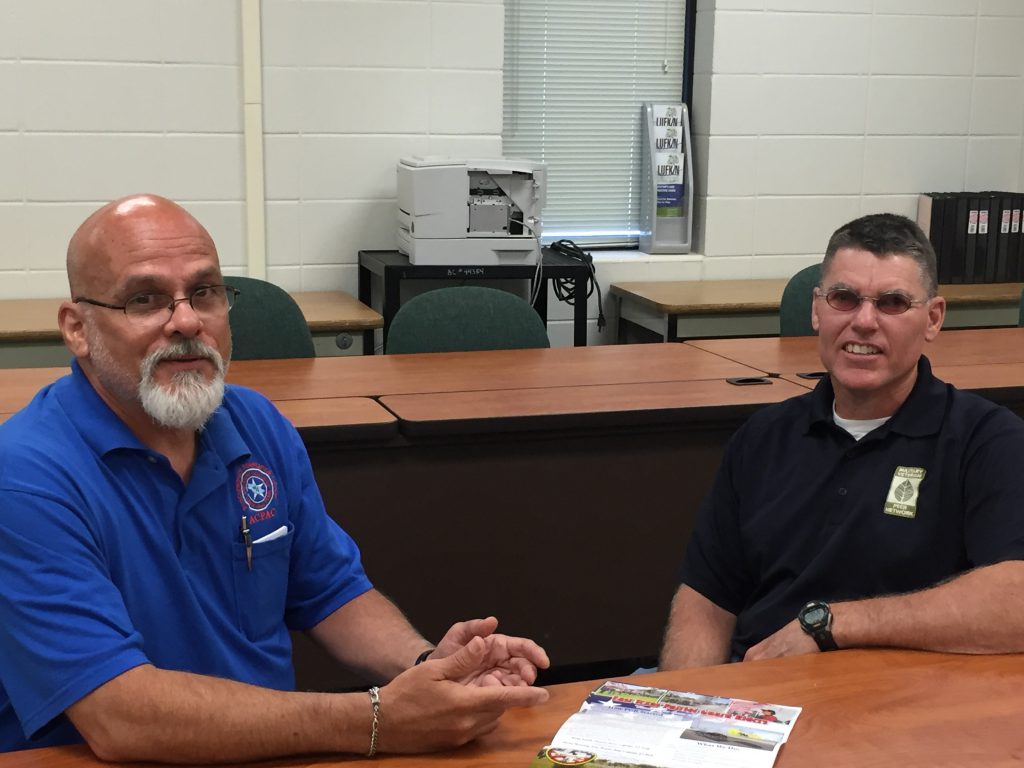Published in the Nacogdoches Daily Sentinel on May 30, 2016
News Editor’s note: The following feature is the last in a series highlighting May as mental health month.
By Kinnie Reina, Burke
Two years ago, retired United States Army major, Jeffrey Smith found relief in the Lufkin-based Military Veteran’s Peer Network. Smith retired from the Army in 2006 after 21 years of service. During his last three years of service, he served as XO (executive officer) at Fort Polk in Louisiana, where his brigade ensured that National Guard and Reserve units were trained and ready to be deployed overseas. During his tenure, his brigade processed over 4,000 soldiers and lost 32.
Upon reentry to civilian life, Smith created a wall of isolation around him. He distanced himself from his family by getting a night job delivering newspapers so that he could sleep during the day while his wife was at work and his kids were at school. He set up a covered hammock in the backyard so that he could sleep outside where he was most comfortable. Within a year, his marriage ended in divorce and his father, a retired Air Force officer, passed away.
Two years ago, several things broke Smith of this isolation and withdrawal from society. Initially, it was his kids; they showed him that they loved him and weren’t giving up on him. Then his brother helped him find a new job; he found peer support at the MVPN in Lufkin, and he began to give back to others.
He started working at Angelina College Procurement Assistance Center (ACPAC), a grant-funded entity that assists small businesses in understanding and qualifying for government contracts. This job fits Smith well; he had worked as a supply officer, managing military contracts during his time in the army. Smith enjoys his job as he gets to work one-on-one with clients rather than give presentations in front of large groups. He still finds himself leaving movie theaters or crowded stores when anxiety sets in.
A Friendly Foxhole
MVPN provides him with a sense of belonging through fellowship with other veterans. Smith describes the MVPN in Lufkin as a “friendly foxhole.” “I get a sense of relief when I pass by the center,” Smith said. “Even if I don’t have the time to stop in, I know that it is a place of support and camaraderie. It is there if I need it.”
“Veterans are trained to suck it up, to drive on, and they don’t show weaknesses,” Smith said. “That helps on the battlefield, but it’s not real life, and that approach doesn’t work back home. We need to ask for help, and that’s hard for us.”
Jeff Hendrick with the MVPN stated that just recently the center helped a 94-year-old veteran with his first VA claim. Before this claim, he wasn’t receiving any veteran’s assistance for his injury, because as he saw it, nothing was wrong with him and he just hadn’t taken the time to take care of it. However, an ammunition crate had crushed his leg during his service in World War II.
Opportunity rather than obligation
Eighteen months ago, Smith joined the East Texas Patriot Guard Riders to give back; he now serves as a Ride Captain. PGR members attend funeral services of fallen American veterans and first responders to show respect for those heroes, their families, and their communities. For Smith, being a member has been as helpful for him as it has been for the families he supports.
On one of their latest missions, PGR escorted Army Cpl. Davey Bart, a Korean War veteran whose remains were recently identified, 65 years after leaving home at 18. The guard riders honored him by standing guard outside the funeral.
Smith gave 21 years of his life in a career of selfless service and spent six years struggling to find his place in civilian life. Now, after finding acceptance, fellowship and a place to contribute, he gives of himself to veterans in the East Texas community.
He offers the following advice to fellow soldiers upon leaving service and returning home.
- Connect with others
- Find someone you trust in your foxhole
- Don’t isolate yourself
- Realize you aren’t alone
- Find a way to give back
Many returning soldiers don’t want to admit that they need help, but programs like MVPN allows them to “embrace their cluelessness” and find the help that they need.
PTSD
Once called shell shock or battle fatigue syndrome, Post Traumatic Stress Disorder (PTSD) is a serious condition that can develop after a person has experienced or witnessed a traumatic or terrifying event in which serious physical harm occurred or was threatened.
- PTSD is a medical condition; it is the body and brain’s response to overwhelming stress.
- PTSD is a lasting consequence of traumatic ordeals that cause intense fear, helplessness, or horror, such as a sexual or physical assault, the unexpected death of a loved one, an accident, war or natural disaster. Families of victims can also develop PTSD, as can emergency personnel and rescue workers.
PTSD Symptoms:
- flashbacks or reliving the event over and over
- nightmares and trouble sleeping
- feeling on edge or feeling nothing
- intense guilty
- trying to avoid things that remind the person of the trauma
- angry outbursts
- change in appetite
- panic attacks
- depression or suicidal thoughts
- substance use
Lufkin MVPN
Veterans, servicemen and women, and their families across our region can find support at the local Military Veteran Peer Network (MVPN), housed at 3003 North Medford Drive and headed up by Volunteer Coordinator, Jeff Headrick, himself a former Marine. Contact Jeff at (936) 225-2887. Visit myburke.org/events for information on MVPN events and fellowship opportunities.
The Military Veteran Peer Network is an affiliation of service members, veterans and family members dedicated to providing a safe and understanding network of support with those who have “been there and done that” and developing trusted relationships with others by shared life experiences.
The center also offers networking with local, state and national resources that offer assistance to veterans. Networking resource topics include reintegration, marriage and family issues, financial and legal assistance, PTSD and TBI treatment, depression, anxiety and anger, alcohol and substance abuse, military sexual trauma, education and job training, homelessness, Veterans Affairs claims and benefits, and an extensive database of services.




